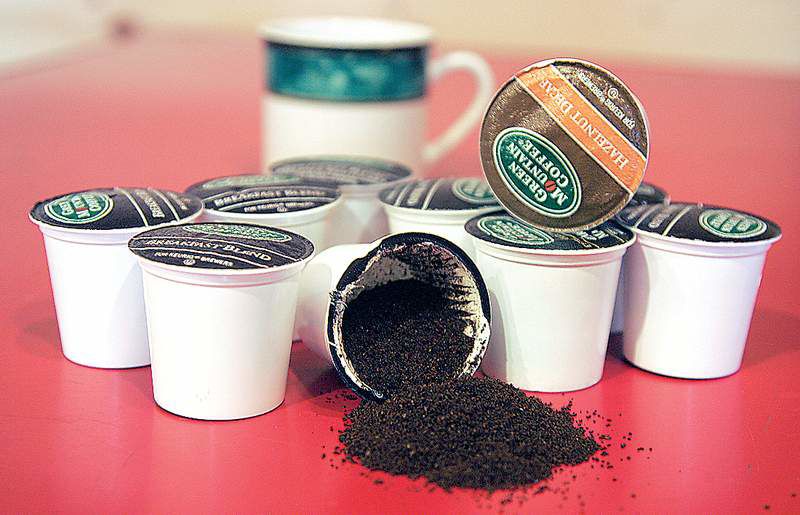A coffee pod conundrum
Published 5:00 am Wednesday, August 4, 2010

- Green Mountain Coffee Roasters’ coffee pods are nonrecyclable, nonbiodegradable and designed to be thrown away after a single use. The company is beginning to work on ways to make them more environmentally friendly.
WATERBURY, Vt. — Green Mountain Coffee Roasters has built a reputation as an eco-friendly company since it was founded nearly 30 years ago.
It started composting used coffee grounds in 1983, helped develop an eco-friendly paper cup in 2006 and last year installed a huge solar array on the roof of its distribution center. The company’s motto, “Brewing a Better World,” reflects its belief that it has a responsibility to help improve living conditions in regions that grow coffee beans.
But its recent growth has been fueled by a product that runs counter to its reputation. More than 80 percent of Green Mountain’s $803 million in sales last year came from nonrecyclable, nonbiodegradable, single-use coffee pods and their brewing systems. This year, the company expects to sell nearly 3 billion K-Cups, the plastic-and-tinfoil pods that are made to be thrown away — filter, grounds and all — after one use.
Now Green Mountain and its rivals are beginning to wrestle with the waste issue and searching for ways to make the packaging greener. Possible solutions include more use of biodegradable packaging, programs to recycle the pods or making the coffee filters themselves reusable.
“The whole concept of the product is a little bit counter to environmental progress,” said Darby Hoover, a senior resource specialist for the Natural Resources Defense Council. “If you are trying to create something that is single-use, disposable, and relies on a one-way packaging that can’t be recycled, there are inherent problems with that.”
Innovation
In the battle for market share, single-serve systems are helping coffee remain competitive, Judith Ganes-Chase, a consultant to the coffee industry, said. “The industry has to be innovative. There is a lot of competition from other beverages in the marketplace,” Ganes-Chase said. “One of the biggest issues has always been the convenience factor of how to get a good cup of coffee to the consumer at any point in the day, when it is demanded.”
Ric Rhinehart, executive director of the Specialty Coffee Association of America, said that although single-serve sales were growing rapidly, they still amounted to a small percentage of the more than 100 billion cups of coffee Americans drink every year.
Green Mountain’s K-Cups come in 300 varieties of coffee, tea and hot chocolate, and a new line of blends made to be brewed over ice.
Michael Dupee, Green Mountain’s vice president for corporate social responsibility, said some customers did not like to see the waste. “Consumers see the waste stream,” Dupee said, “and they compare it to what they had done before, and they have a perception that there is a problem.”
To some consumers, however, the convenience and efficiency override the waste issue.
“We used to make a pot of coffee, and we would be throwing it out all the time,” said Michael Hurley, who uses the K-Cup system for concessions at small-town movie theaters he owns in Belfast and Houlton, Maine. “So we don’t do that anymore. And when people come in, they get exactly what they want.”
Finding solutions
Dupee showed off a prototype that Green Mountain planned to test this summer. It is a paper K-Cup, filled with Celestial Seasonings tea, that eliminates the plastic and the aluminum foil. In addition, he said many consumers had started brewing coffee in reusable metal-mesh filters for the Keurig machines, which accept ground coffee.
Green Mountain, he said, has also commissioned a life-cycle analysis to understand the environmental costs of the K-Cups. Though he would not discuss details of the analysis, pending a third-party review, he did say the study found that most of the impacts occur where the packaging is produced, not where the waste is disposed. He said he had been working with suppliers to make their manufacturing processes cleaner and more efficient.
Green Mountain’s chief executive, Lawrence Blanford, said the K-Cups had some environmental benefits. Brewing one cup at a time means less wasted coffee at the bottom of the pot, and this reduces the overall environmental impact per cup of coffee.
K-Cups are also increasing demand for fair-trade coffees, he said, which accounted for 30 percent of Green Mountain sales in 2009. Fair-trade-certified coffees ensure that coffee farmers are paid a fair price per pound, and that coffee farms meet certain environmental standards.
Peter Meehan, chief executive of Newman’s Own Organics, said the success of the K-Cups, which are his company’s fastest-growing product, had helped Newman expand the market for organic products.
Still, Hoover wonders whether there is a simpler solution to the waste question. “At some point you have to ask, ‘But do we need this product enough that we need to be trying to find all these different solutions for the components of it, or can we just go back to the old way that we used to make coffee, and was that good enough?’”






